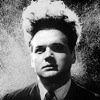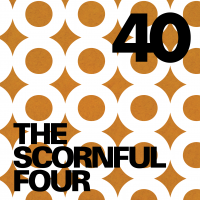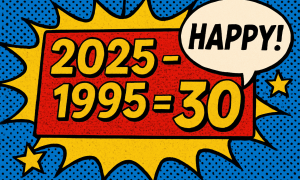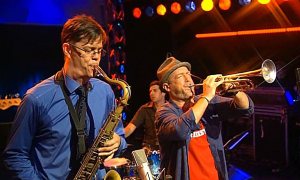Home » Jazz Articles » Genius Guide to Jazz » Revenge of the Return of the Son of Ken Burns' "Jazz"
Revenge of the Return of the Son of Ken Burns' "Jazz"
Many jazz aficionados felt that Jazz completely overlooked or deliberately disregarded the contributions of non-human musicians. It is well-known among jazz scholars that pioneering tenor saxophonist Frankie Traumbauer was, in fact, a very large raccoon.
Forget I said that.
What I mean is, the Genius Guide exists principally for two reasons: to inform and amuse both seasoned jazz fans and newcomers alike, and to achieve for myself worldwide fame and/or notoriety so that I can finally afford that decadent lifestyle I've had my eye on. Which is why I can understand Ken Burns.
You see.
Like Ken (I call him Ken. Who's going to stop me?), I have an interest in the Civil War, baseball, and jazz. But unlike Ken, I do not have at my disposal the means to make week-long documentaries about the things which interest me. It's just as well, because I don't think PBS would air my proposed 15-hour films about redheads and beer anyway. So I have to confine the exploration of my interests to the written word, where I can do the most irreparable damage.
Be that as it may.
As pleased as we all were with Ken's monumental documentary, in that it got a lot of people talking about jazz who wouldn't otherwise, there is the general sense in the jazz community (located off I-64, near the Cracker Barrel) that Jazz may have missed the mark a little when it comes to a complete and thorough examination of the music and those who created and prospered it. In fact, out of the entire twenty hour documentary, I came away with only three salient points:
- Apparently, Louis Armstrong was very important.
- There was a time when black folks weren't particularly well-liked in this country.
- Duke Ellington.
I would be remiss in my duties as a Genius to leave the average person with such an incomplete understanding of jazz. I've already covered most of the important history, but there is so much more to the rich tapestry of jazz yet to be uncovered. So I've decided to devote this month's column to addressing what I felt to be some of the more glaring omissions.
First and foremost would be a personal complaint, the oversight of Johnny Hartman. His luxurious baritone is perhaps one of the finest vocal instruments in the history of jazz. Woefully under-recorded (his voice was so smooth, it slid right off of most vinyl records. Advances in digital recording came too late, as Hartman died in 1983), his best work came with John Coltrane on the classic album John Coltrane and Johnny Hartman. To this day, Hartman's voice has an almost mystical seductive effect on women. Give me a bottle of wine and a Johnny Hartman record, and I could get k.d. lang's bra off (and then put it right back on, because I'm just trying to prove a point).
 Many jazz aficionados felt that Jazz completely overlooked or deliberately disregarded the contributions of non-human musicians. It is well-known among jazz scholars that pioneering tenor saxophonist Frankie Traumbauer was, in fact, a very large raccoon. And who could forget the seminal vibe work of "Bulldog" Benny Shanks (who, despite the nickname, was actually a Boston terrier). Recording for Blue Note in the mid-sixties and touring with such luminaries as Lee Morgan, Kenny Burrell, and "Slow" Willie Peach (himself a garden snail, tragically sautéed during a gig in Paris in 1972), it is said that Shanks could be driven to awe-inspiring solos just by scratching him behind the ear as he played. And I have it on fairly good authority that Louis Armstrong's first wife, pianist Lil Hardin, was a beaver (although, I may have just taken an anecdote out of context).
Many jazz aficionados felt that Jazz completely overlooked or deliberately disregarded the contributions of non-human musicians. It is well-known among jazz scholars that pioneering tenor saxophonist Frankie Traumbauer was, in fact, a very large raccoon. And who could forget the seminal vibe work of "Bulldog" Benny Shanks (who, despite the nickname, was actually a Boston terrier). Recording for Blue Note in the mid-sixties and touring with such luminaries as Lee Morgan, Kenny Burrell, and "Slow" Willie Peach (himself a garden snail, tragically sautéed during a gig in Paris in 1972), it is said that Shanks could be driven to awe-inspiring solos just by scratching him behind the ear as he played. And I have it on fairly good authority that Louis Armstrong's first wife, pianist Lil Hardin, was a beaver (although, I may have just taken an anecdote out of context). Which brings me to another point.
 Jazz woefully underplayed the contributions of women to the music. Not only were there many great female musicians and singers, but it is a known fact that virtually every musician who has ever picked up an instrument has done so, at least in part, to impress the opposite sex. It was a dancing woman that spurred Paul Gonsalves to his legendary 27-chorus barn-burner during Duke Ellington's performance at the 1956 Newport Jazz Festival. Do you think he would have put on a show like that had it been a dancing jazz critic? Do you think Miles Davis would have swaggered and scowled the way he did if it wasn't getting him chicks? Do you think I'd be slaving over this steaming vat of complex gibberish if I didn't think there might be some leg in it for me somewhere down the line?
Jazz woefully underplayed the contributions of women to the music. Not only were there many great female musicians and singers, but it is a known fact that virtually every musician who has ever picked up an instrument has done so, at least in part, to impress the opposite sex. It was a dancing woman that spurred Paul Gonsalves to his legendary 27-chorus barn-burner during Duke Ellington's performance at the 1956 Newport Jazz Festival. Do you think he would have put on a show like that had it been a dancing jazz critic? Do you think Miles Davis would have swaggered and scowled the way he did if it wasn't getting him chicks? Do you think I'd be slaving over this steaming vat of complex gibberish if I didn't think there might be some leg in it for me somewhere down the line? My point exactly.
 I know I am not alone in my feeling that Burnsie (I think I know him well enough to call him Burnsie. Between Baseball and Jazz , I've spent more time with him than I did in college, which explains a lot) may have slightly exaggerated the stature of a few musicians. As supremely gifted as Louis Armstrong and Duke Ellington were, and as much as they elevated the music, I have to remain somewhat doubtful that they also used their super powers to fight crime. Although I do not know for certain the secret identities of real-life superheroes The Atomic Lip and Duke Danger from that era, I felt it was rash of Burnsie to conclude that they were Armstrong and Ellington based solely on the fact that you never saw them together in the same place at the same time.
I know I am not alone in my feeling that Burnsie (I think I know him well enough to call him Burnsie. Between Baseball and Jazz , I've spent more time with him than I did in college, which explains a lot) may have slightly exaggerated the stature of a few musicians. As supremely gifted as Louis Armstrong and Duke Ellington were, and as much as they elevated the music, I have to remain somewhat doubtful that they also used their super powers to fight crime. Although I do not know for certain the secret identities of real-life superheroes The Atomic Lip and Duke Danger from that era, I felt it was rash of Burnsie to conclude that they were Armstrong and Ellington based solely on the fact that you never saw them together in the same place at the same time.  It is also a major point of contention among jazz fans (which are a lot like regular oscillating fans, except that they swing harder and are much cooler) that Burnsie may have also concentrated too heavily on the music prior to 1961 and skimmed over the last forty years. I feel compelled to come to Burnsie's defense on that count. To me, Jazz was a primer, a McGuffy's Reader for the hip set (See Pops. See Pops blow. Blow, Pops, blow). Its job was to provide context, it give us a sense of where the music had been so that we may better understand and appreciate where it is today on our own terms. One can't listen to Kenny G with a straight face after hearing Sidney Bechet, but that doesn't invalidate everything that has happened since Bechet. It only fosters a maturity in the listener, a higher expectation that makes it more difficult for us to accept lesser efforts. How popular do you think Britney Spears would be in a world where everyone has heard Sarah Vaughn? About as popular as a half-naked, surgically-enhanced teenager with no apparent sense of shame can be, which is not the point I'm trying to make at all.
It is also a major point of contention among jazz fans (which are a lot like regular oscillating fans, except that they swing harder and are much cooler) that Burnsie may have also concentrated too heavily on the music prior to 1961 and skimmed over the last forty years. I feel compelled to come to Burnsie's defense on that count. To me, Jazz was a primer, a McGuffy's Reader for the hip set (See Pops. See Pops blow. Blow, Pops, blow). Its job was to provide context, it give us a sense of where the music had been so that we may better understand and appreciate where it is today on our own terms. One can't listen to Kenny G with a straight face after hearing Sidney Bechet, but that doesn't invalidate everything that has happened since Bechet. It only fosters a maturity in the listener, a higher expectation that makes it more difficult for us to accept lesser efforts. How popular do you think Britney Spears would be in a world where everyone has heard Sarah Vaughn? About as popular as a half-naked, surgically-enhanced teenager with no apparent sense of shame can be, which is not the point I'm trying to make at all. Perhaps the question we should be asking about Jazz isn't "What is it lacking," but "What can we bring from it?" Maybe it wasn't Burnsie's intention to deliver a definitive document of jazz from beginning to end, a post mortem for an art that has been pinned and mounted like a butterfly. As someone smarter than me (but just barely, because I am still a Genius) said, one murders to dissect. Maybe Ken (back to Ken, are we?) was just trying to add some oil to the machine, some grease to the gears, some butter to the Brando (and if you can find a better Last Tango in Paris joke anywhere on the Web, I'll personally give you $4 cash). Maybe his sole point was to get us all talking about jazz again, listening to jazz in a new light, and playing it with renewed vigor (renew your vigor now and save 25% off the regular newsstand price). I can't speak for you (well, I could, but I won't), but as for myself, after reflecting once again on the entire 20 hour film, I was inspired to set a new record for parenthetical asides in a single paragraph just now. And that's really saying something, although I'm not quite sure what.
The point being.
Jazz has always been about the immediacy of the moment, about using echoes from the past to create something entirely unique in the now. Jazz has always inspired—and should always inspire—passion, debate, controversy and just enough silliness to keep us from ever taking ourselves too seriously. And for all its flaws and foibles, in the end, Jazz has done just that. And AAJ will continue to do so for years to come. And as for me, your own personal Genius, I'll continue to be here month after month, doing whatever in the hell it is that I do (I haven't been paying close attention).
Till next month, exit to your right and enjoy the rest of AAJ.
Tags
PREVIOUS / NEXT
Support All About Jazz
 All About Jazz has been a pillar of jazz since 1995, championing it as an art form and, more importantly, supporting the musicians who make it. Our enduring commitment has made "AAJ" one of the most culturally important websites of its kind, read by hundreds of thousands of fans, musicians and industry figures every month.
All About Jazz has been a pillar of jazz since 1995, championing it as an art form and, more importantly, supporting the musicians who make it. Our enduring commitment has made "AAJ" one of the most culturally important websites of its kind, read by hundreds of thousands of fans, musicians and industry figures every month.
























